30 days of atproto: hope for an open future

It's a beautiful day here in New York. Zohran Mamdani was elected on a message of hope and change (and significantly more concrete change than the last time something similar happened). This is also the final day of my 30 days of atproto project, which works out thematically quite well. I have a lot of hope for atproto, and while there's a lot of work in front of us (just as there is for the mayor-elect), I am thrilled at the prospect of building something that felt impossible a few years ago, a sea change for how we think about social technology.
The web is built on open standards, but over the last 20 years, it's gone from an idealistic place to a crushingly depressing one. It's held up by monopolies in all but name, built on cynical business models and open contempt for users. I do not think any one protocol can change this. But I do think a hopeful, optimistic model of the open web is a step towards taking back our digital commons.
Over the past month I have been struck by that level of optimism over and over again. The design of atproto (while I think it's brilliant, don't get me wrong) isn't an E=mc2 flashbulb moment. It's just an idea that I think none of us were optimistic enough to have for a long time. What if social apps were open by default? What if people owned their own data? What if the same way we think about the open web, about shared protocols, about open source, applied to our lives online?
I think this is one of the most important battles we're fighting right now. While I get the argument that this shit is for nerds, social media is one of the biggest pillars of our lives right now. We are always in what my friend Cade calls the Para-Real. The digital and the physical aren't separate spaces anymore. You can and should touch grass but you're not going to live laugh love the algorithms that make people go insane away.
We are in a battle for our collective souls against centralized power in the private and public sphere right now. Decentralization alone isn't going to save us - nazis can use a decentralized protocol just as easily as I can - but it's a start. It's taking back our digital sovereignty: owning our data, being able to vote with our feet, being able to credibly exit from platforms when they go from desperately trying to get our business to squeezing us for every last penny.
It is a fight to take back what's rightfully ours but it is also a bold hope for what a technical ecosystem can look like. A world of open APIs where applications talk to each other by default. Where you live and die on what you provide your users rather than by locking them in and making leaving so painful that they stay on as long as possible. A chance for competitive collaboration: to work on the underlying architecture, to get close to the metal, together.
ATProto is not the first technical stab at these questions, but so far it's the strongest one I've seen. People are building on this, and not just the type of self-hosting obsessed paranoiac that's always tried to adopt these things. We're gonna need the normies in all the battles to come and while I don't expect my Dad to start self-hosting a PDS anytime soon the fact that I can get someone like him onto one I own and run is amazing. ActivityPub walked so atproto could run but I never felt that way about Mastodon.
I've talked about this a bit in the last few days but the thing I'd most love to see next is to get more artists and creatives on atproto. I make my bones doing old-fashioned software engineering these days but I've always had one foot in the creative tech world and this is the first time I've felt excited about social tech since the days of Cow Clicker and Twitter bots. I want as many people building on this ecosystem as possible - figuring out how to make its killer app, how we can have the interconnected world so many of us have wanted for so long - but (if only for the sake of my own self-interest) most of all I want to see what interventions, what tools, what detournements open social can afford us. Being creative online has mostly felt like the walls are closing in around you for at least a decade, and this looks to me like the first chance we've had in ages to tear them down: to insist on the freedom of creative expression we should demand in every avenue of our lives, unbound by the limits of platforms and developer agreements and paid APIs.
There are a lot of ways this protocol could fail. There are a lot of ways we could go back to the status quo. And what exists right now is by no means perfect. But I know that we are capable of building something better, and the worst thing to do of all is look in the face of what's against us and give up without having tried. So I'm going to keep hacking away with ATProto and doing my little part to contribute to a better world, online and in real life. I hope you'll join me.